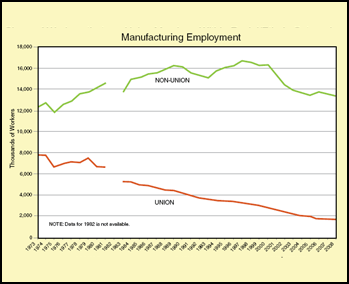| Top labor leaders continue to hype the perceived benefits of the widely publicized, union-strengthening Employee Free Choice Act (EFCA), aka “Card Check, ” that the Senate failed to pass in the 110th congressional session. |
| |
| But another, relatively obscure bill in the 111th Congress has greater potential to significantly advance the earning power of all unionized employees. However, unlike EFCA, this one is vehemently opposed by labor unions. |
| |
| Introduced by Senator David Vitter (R-La.) and Rep. Tom McClintock (R-Calif.) on June 4, 2009, the Rewarding Achievement and Incentivizing Successful Employees Act (RAISE Act) would amend the National Labor Relations Act (NLRA) of 1935 to allow employers to pay higher wages to their employees through merit pay systems, bonuses or other incentive awards based on increased productivity or stellar performance. Current federal law caps the wages of unionized workers through collective
bargaining agreements (CBAs) that establish both a wage floor and a wage ceiling. |
| |
| It doesn’t seem logical that an act of Congress would be required for a company to monetarily reward its most productive workers, but for union members, it actually does. Without the passage of the bill, employers who pay union employees incentive wages are committing an unfair labor practice under the NLRA or violating the terms of a CBA. |
| |
 |
| [Place cursor over graph to enlarge] |
| |
|
|
| A Heritage Foundation study estimates the RAISE Act would give a union worker the opportunity to earn an annual increase of $2,600 to $4,300, money that would be pumped back into the nation’s recession-strapped economy. |
| |
| Ironically, the Center for Individual Freedom (CFIF), a non-partisan U.S. policy advocacy organization, points out that the additional earnings would be three to five times higher than the tax cuts President Obama promised to the middle class. |
| |
| Economic research shows that the average worker’s earnings rise by 6% to 10% when wages are performance driven. This type of legislative incentive would potentially provide 8.6 million union members covered by the NLRA the ultimate economic stimulus by creating wealth (not redistributing it) through their own hard work. |
| |
| This compelling data begs the question: Why would labor unions oppose this no-brainer legislation to reward workers for initiative and productivity? The answer is simple… workers earning more than their contract wage rates understand it is their individual effort—not the union— that enabled them to prosper, and this weakens a union’s attraction to its members. |
| |
| While the NRLA may have been necessary legislation for the assembly-line manufacturing economy of the 1930s, it no longer benefits the workers in today’s fastest-growing, highly skilled professions—executive, technical, sales and professional-specialty occupations. The simplicity of the RAISE Act–maintaining the wage
floor, but lifting the wage ceiling–embodies President Obama’s vision for American workers to succeed through performance and productivity. |
| |
|